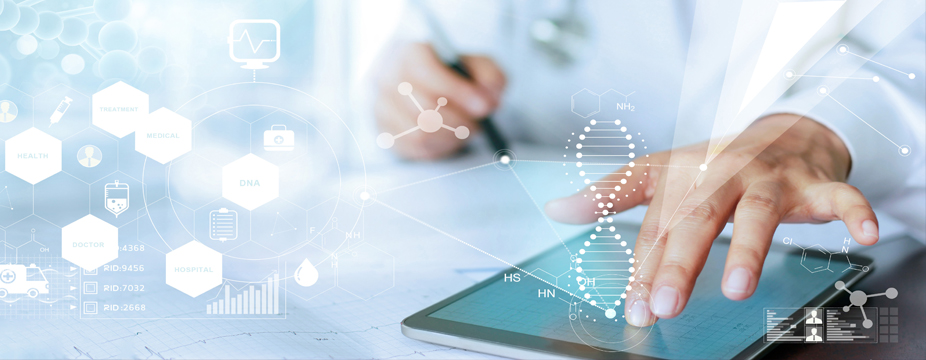|
Getting your Trinity Audio player ready...
|
AI in eHealth or digital health is the cornerstone of developed healthcare units. It is escalating at a rapid pace and the E-health business contributes to 41% of the healthcare markets. E-health is a prominent tool that should be leveraged by developing and underdeveloped healthcare units to offer optimized patient outcomes.
eHealth is widening the facilities & services provided by traditional healthcare units. eHealth or digital health systems aim at using telecommunication and digital intelligent technologies at the core to facilitate health improvement and healthcare services. Well-known synonyms for E-healthcare are mHealth, telehealth, and digital health. eHealthcare systems are the combination of digital healthcare technologies and intelligent systems under one umbrella to offer an enduring cure to patients.
A good example of digital health will be virtual home care solutions. The virtual home care solution platform offers diagnosis via connecting to a physician or doctor in a particular field of expertise through an internet-connected device. Virtual care allows chronically ill or elders in the house opting the best treatment at their convenience. On the other hand, digital healthcare services reduce the long waiting hours at hospitals by enriching the time contributed to the diagnosis of individual patients. It helps in providing healthcare services in remote areas, saves costs, and makes healthcare units more resilient.
AI in eHealth: Transforming Digital Healthcare
The growth of health and care systems is necessary and vital with increasing medical needs and the evolution of new diseases and viruses. AI-integrated intelligent systems can efficiently make a series of actions or vital decisions based on the insights derived after harnessing the data obtained. AI has the potential to escalate E-healthcare in many ways and below mentioned are a few forms of it.
1. Health informatics:
Health informatics is the digital management of patient records, hospital data, disease symptoms, and diagnosis procedures, etc. AI-based intelligent systems by leveraging Deep Learning & Machine learning can help in diagnosing, radiology, and automating administrative tasks, and aims at reducing operational costs by utilizing health informatics. The rapid pace of AI in processing patient information and images that are likely to identify the symptoms that arrive at the disease reduces the diagnosing-treatment-recovery cycle of the patients.
2. Telemedicine or Telehealth:
Telemedicine and telehealth focus to facilitate remote diagnoses and clinical care digitally. It helps in eliminating long waiting hours at hospitals and other administrative tasks. According to recent reports from Gartner, soon robots will deliver telemedicine and telehealth services to people. AI systems are advancing health services by helping physicians in making the right decisions to help their patients in getting a better cure.
3. EHR (electronic health records):
Electronic health records are the digital versions of paper charts in clinicians’ offices. AI systems are well-defined for their ability to optimize and provide better insights based on their past learnings. The clinics and healthcare institutions can obtain the data during emergencies to treat their patients. It helps hospitals in providing cures and better patient outcomes.
4. Clinical decision support systems:
Clinical decision support systems help clinics, doctors, and health professionals in making vital clinical decisions when required. AI systems enhance the decisions made by healthcare units to provide an advanced cure. AI pathway companion maps patient-specific cures and facilitates real-time factual decisions. Clear mapping of time-time diagnoses and treatments helps in making evidence-based decisions.
5. Consumer health informatics:
Consumer health informatics is the digital device to monitor exercise, weight, eating habits, and more demographical data of the patients. These systems help in keeping an eye on the patient’s daily habits and environments. In case of any emergency, consumer health informatics helps in providing better treatment. AI-integrated consumer health informatic systems mostly include chatbots, voice assistants, mobile apps, digital applications, virtual assistants, robots, etc. These AI in eHealth systems can play a vital part in collecting, storing, and analyzing information from consumer health informatics.
The comprehensive state-of-the-art reveals that AI has a prominent role in the eHealthcare domain. The advancement of AI and robotics is increasing the percentage of cures provided to patients in niche and unserviceable areas. The boom of digital services is helping healthcare in providing better treatment by integrating digital and intelligent systems. With an increasing demand for the doctors required and the emergence of new kinds of viruses & diseases, eHealth care would be the ultimate tool to reach large geographical regions to serve patients, provide treatment, and create awareness. The eHealth data helps patients in taking preventive measures to stop pandemic situations like COVID-19.
If you need any help with idea validation, proof-of-concept, Data Science consulting, large-scale AI implementation, Big Data Engineering, or a creative solution for your AI in ehealth data. You are at the right place.
Talk to our experts

